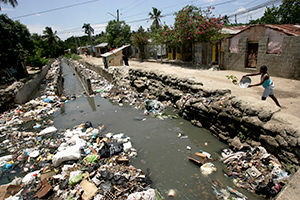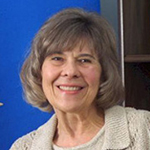Like other scientists around the world, Dr. Jame Schaefer, an associate professor of theology at Marquette University, kept a close eye on the proceedings at the 21st United Nations Climate Change Conference in Paris last month.
 Pope Francis emphasized protection for the environment and the need to mitigate climate change in his second encyclical, “Laudato Si’,” released in June. In this June 6, 2009, photo a woman throws rubbish into a stream that crosses the neighborhood La Cienaga, Dominican Republic. (CNS photo/Orlando Barria, EPA)As a Catholic and academic whose main area of research is the interconnectivity of theology and ecology, Schaefer had an especially keen interest in the developments at the conference, also known as COP 21, which resulted in the yet-to-be-ratified agreement.
Pope Francis emphasized protection for the environment and the need to mitigate climate change in his second encyclical, “Laudato Si’,” released in June. In this June 6, 2009, photo a woman throws rubbish into a stream that crosses the neighborhood La Cienaga, Dominican Republic. (CNS photo/Orlando Barria, EPA)As a Catholic and academic whose main area of research is the interconnectivity of theology and ecology, Schaefer had an especially keen interest in the developments at the conference, also known as COP 21, which resulted in the yet-to-be-ratified agreement.
During the conference, Schaefer kept in contact with staff members working on the Holy See’s delegation.
“I was pleased to see the Vatican delegation continuing to emphasize the points Pope Francis made in ‘Laudato Si,’” she said. “From his first homily as our 266th pope, he has expressed concern about ecological problems that degrade God’s creation, most adversely affect poor and vulnerable people today, and threaten future generations with an impoverished planet.”
The Vatican delegation has permanent observer/non-voting status at the United Nations and the COP summits, and though they cannot negotiate themselves, Schaefer said the delegation was able to “inform, encourage and morally support voting delegates during the COP through various communications and in between sessions.”
The delegation worked closely with the Climate Vulnerable Forum, comprised of 20 countries that identify themselves as the most vulnerable to the adverse effects of climate change. The forum is headed by the Philippine delegation and consists of developing nations, including several African and Central American nation states.
The Vatican delegation’s concern for the ecological well-being of the vulnerable nations served to underline the issues of shared responsibility and equality between the rich and the poor – issues at the heart of Pope Francis’ views on climate change.
“When the environment is assaulted, the poor, least able to defend themselves, suffer most,” said Cardinal Peter Turkson in an address to the conference on Dec. 8.
“Rising sea levels surrounding islands from Southeast Asia to islands off the northern coast of Alaska are forcing indigenous peoples to leave their ancestral lands and to migrate to other areas. They are climate refugees,” Schaefer said. “At COP21, vulnerable nations who are experiencing sea level rises and other adverse effects of the greenhouse gases emitted by industrialized countries argued for limits on emissions that might avoid a catastrophic increase in the global temperature and exacerbate the problems experienced today and projected into the future.”
Environmental concerns are religious concerns
Schaefer said concern for the environment is “a very strong Catholic tradition.” While Pope Francis made headlines for  Dr. Jame Schaeferhis inclusion of climate change issues in “Laudato Si,” he is not the first pope to address these issues. In fact, in the opening passages of the encyclical, Francis refers to teachings of his predecessors Blessed Pope Paul VI, St. Pope John Paul II and Pope Benedict XVI.
Dr. Jame Schaeferhis inclusion of climate change issues in “Laudato Si,” he is not the first pope to address these issues. In fact, in the opening passages of the encyclical, Francis refers to teachings of his predecessors Blessed Pope Paul VI, St. Pope John Paul II and Pope Benedict XVI.
“Catholics and members of other Christian denominations, as well as Judaism and Islam, share a basic belief that Earth, our planetary home, constitutes part of God’s creation. God has made the entire universe possible; it would not exist if God had not willed it into existence and if God did not continue to sustain its existence,” said Schaefer.
She noted Catholic tradition holds that “we have a responsibility to God for how we are functioning within this wondrous creation that is God’s.”
Likewise, in “Laudato Si,” Pope Francis intertwines a concern for the well-being of the earth with the moral strength of its inhabitants. He calls the earth “our common home” which “is like a sister with whom we share our life….This sister now cries out to us because of the harm we have inflicted on her by our irresponsible use and abuse of the goods with which God has endowed her.”
Francis goes on to say that this abuse is derived from a “throwaway culture” mired in consumerism that has an inordinate effect on the poorest populations of the world, and those who seek to solve the problems are “far removed from the poor, with little direct contact with their problems” and too quick to embrace solutions like population control and abortion, which the encyclical blasts as “incompatible with concern for the protection of nature.”
“Our relationship with the environment can never be isolated from our relationship with others and with God,” he writes. “Otherwise, it would be nothing more than romantic individualism dressed up in ecological garb, locking us into a stifling immanence.”
“He is loving, and love runs through this encyclical,” said Schaefer, who said she observes a strong Ignatian influence in Francis’ writings and actions. “He is both the messenger of God’s love and an outstanding example of how to love and serve God by loving and serving others.”
The Paris Agreement and beyond
Schaefer said she was pleased with the conference’s Paris Agreement, which, among other goals, seeks to limit the global temperature rise to 1.5 ˚C above pre-industrial levels. She is especially grateful for that condition.
“Staying with that aim should be prove less damaging, especially to the low-lying nations and coastal areas,” Schaefer said.
The agreement also calls for developed countries to provide more financial resources to developing countries in adapting the agreement’s stipulations.
“The commitments the nations made, with more anticipated, to the Green Climate Fund (one of the conference’s financial mechanisms) are also gratifying to know, because funds are needed by the developing nations to invest in renewable energy sources and efficiency strategies, mitigate adverse effects of climate change occurring now, and adapt to changes that cannot be mitigated,” said Schaefer.
The agreement also calls for a “global stocktake” every five years, beginning in 2023, to assess global progress in achieving its goals, and also calls for more transparency “including national communications, biennial reports and biennial update reports, international assessment and review and international consultation and analysis,” according to Article 13 of the protocol.
The agreement’s conditions will be applicable to all signing nations from 2020 onward, but there is no legal mechanism to enforce the signatories’ compliance. Critics have expressed doubt that signatories will remain true to their word, but Schaefer hopes the requirements of transparency will motivate signing nations.
The Paris Agreement opens for signatures April 22, 2016 and will enter into force only if 55 countries that produce 55 percent of the world’s greenhouse gas emissions ratify it.
Speaking in St. Peter’s Square Sunday, Dec. 13, after the conclusion of COP21, Pope Francis expressed satisfaction with the agreement’s provisions for the world’s most vulnerable populations and said that implementation will take a concerted effort on the part of all countries.
Catholic action
For Catholics, change must begin at the parish level, Schaefer said. She praised the Archdiocese of Atlanta for creating an action plan to implement “Laudato Si” within its own parishes. The action plan is comprised of a “menu of options” ranked easy, moderate and advanced, advocating education on climate change for parishioners and school students and increased energy conservation and efficiency in parishes and homes.
Schaefer said she is in talks to create a similar plan for the Archdiocese of Milwaukee.
“The implementation of the Paris Agreement requires action at all levels of governance – from individuals in homes to expanding communities,” she said. “(Likewise) parishes within the Archdiocese of Milwaukee must be involved, and studying ‘Laudato Si’ as the faith-based motivation for developing and implementing an action plan is a wise way to begin.”
